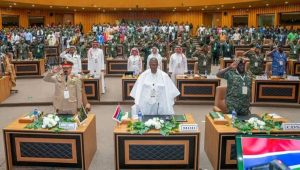The Gambia has taken a significant step in bolstering its counterterrorism capacity with the launch of a military training program organised by the Islamic Military Counter Terrorism Coalition (IMCTC).
The initiative, unveiled on Wednesday at the Sir Dawda Kairaba Jawara International Conference Centre, aims to strengthen the country’s security forces and enhance regional cooperation in combating terrorism.
The training, conducted under IMCTC’s flagship Kafaa Initiative, was officially inaugurated at a high-level ceremony attended by key national and international figures. Among them were the Minister of Defence, Baboucarr Ousmaila Joof; the Secretary-General of IMCTC, Maj. Gen. Mohammed bin Saeed Al-Moghedi; the Chief of Defence Staff, Lt. Gen. Mamat O. Cham; senior government officials, diplomats, and representatives from the Gambia Armed Forces.
The three-week program will train 50 specialized officers 25 from the Ministry of Defence and 25 from the Ministry of Interior through a mix of classroom instruction, field drills, and live-ammunition exercises. The goal is to enhance their tactical readiness and improve coordination in responding to evolving security threats.
In his opening remarks, Defence Minister Baboucarr Joof reaffirmed The Gambia’s commitment to maintaining peace and security both nationally and across the subregion.
“The Gambia remains committed to safeguarding its citizens and contributing to peace and security within our region,” he said. “Hosting this training underlines our dedication to equipping our security forces with the requisite knowledge, skills, and strategic perspectives necessary to confront modern threats.”
Minister Joof also commended IMCTC for its continued collaboration, noting that the coalition’s expertise and resources have been instrumental in strengthening The Gambia’s defense capabilities.
IMCTC Secretary-General Maj. Gen. Al-Moghedi praised The Gambia’s active role in global counterterrorism cooperation, describing the training as part of a wider strategy to build collective security among member states.
“Terrorism knows no borders and makes no distinction between peoples it threatens human security and the stability of societies worldwide,” Al-Moghedi said. “This initiative underscores The Gambia’s pivotal role in addressing security challenges as an active member of global counterterrorism efforts.”
He added that the Kafaa Initiative in The Gambia forms part of a broader IMCTC framework encompassing 15 strategic initiatives, 90 training programs, and 20 awareness and knowledge projects across member countries.

The IMCTC, which unites 42 member nations, focuses on a comprehensive approach to counterterrorism, combining military preparedness with ideological, media, and financial strategies to tackle extremism from multiple fronts.
For The Gambia, the program is not only about training but also about building partnerships and confidence among security institutions. By investing in capacity development and cross-border cooperation, the country aims to reinforce its position as a reliable partner in regional stability and peacebuilding.
As the training progresses, officials say the skills and knowledge gained will have lasting benefits for national security operations strengthening the country’s readiness to respond decisively to emerging threats.





